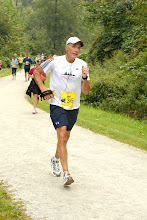A few days ago, I was running in the final mile of the Capital City Half Marathon in Columbus, Ohio. This will be my last half marathon before I turn 60. At this point in the race I know a few things: 1) I will finish; 2) My time will be about my worst half marathon time ever; 3) Despite #2, I am having a good time; and 4) I have only one goal left – get across that finish line without incident or embarrassment. In previous Cap City races, I have seen people collapse during that last mile as well as at the finish line. I don’t want to join them.
I am glad that there are no mirrors or store windows nearby. I have no need to see what I look like at this point of the race. This is not a matter of vanity. It is a matter of reality. I have little self-respect left. All I want to see is that finish line.
But, unfortunately for me, a young man in his 20’s or 30’s provides me with the feedback that I am not seeking or wanting. He runs alongside me, and after sizing me up, he figures that I need a bit of encouragement. He says: “You are going to make it,” then he adds that terrible word at the end of his sentence: “SIR.”
“You are going to make it, SIR.” I can only imagine that he says this because he doesn’t want me to collapse in his general area and present him with the ethical challenge of whether or not to stop or to keep running to get his PR. If he is running near me, he’s not very fast. His words don’t seem uplifting to me. Instead of encouragement, what I hear is: “Man, you look awful. Should someone of your advanced years be running this kind of race? Maybe you should be watching, not running, SIR.”
If I had had enough energy, I would have kicked him. But I probably would have tripped. Instead I said: “We are BOTH going to make it.” At the end of my sentence, I wanted to add (like Dirty Harry would have) “Punk” or at least “Callow Race Participant,” but I had used up the six words I had left.
I don’t remember if he finished ahead of me or behind me. If he finished behind me, I hope he has a self-image healthy enough to withstand the shame of finishing behind a man old enough to be his father. A man who he needed to call: “Sir.”
A recent “New York Times” article asserted that when runners get older, they also get slower. That isn’t exactly shocking news. Ray Fair, a professor at Yale, has created a chart to predict how much slower a runner will get every year after they have passed their peak years. This is not a chart I am all that interested in studying. Who needs a chart about aging when you have yourself as a reference? I’ve got years of race times that tell me all I need to know.
Getting older has its benefits, but your body’s betrayal is not one of them. Just a few days before the race, I was paying a specialist affiliated with a local hospital to do things with my body that I would have punched him for attempting to do to me when I was a teenager.
Trust me. When they say, “Just relax,” that’s the last thing you are able to do. When they say: “You’ll feel a little pressure,” what they really mean is “This is going to be a special pain that you won’t forget for a long time.” And this is just the diagnostic process. I am sure that the treatment will be even more fun.
So a young man calling me “Sir” as I shuffled my way through the last mile of a half- marathon wasn’t really all that bad compared to my intimate time with my new special doctor friend. What I am unclear about is whether or not I am supposed to send the doctor flowers. Maybe after my next visit.
So, runners, walkers, shufflers of all ages and shapes and sizes, here are my words for you: “You are going to make it.” Really. If you are moving ahead at all, I complement you. Keep it up. I am proud of you. It will help you stay as young as you can as long as you can. Moving has got to be less painful than stopping at the doctor’s office.
